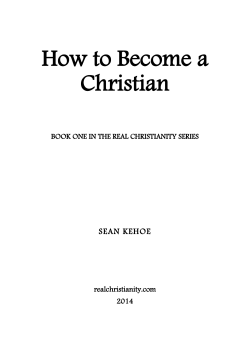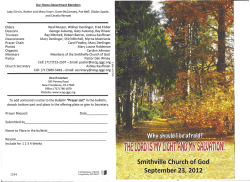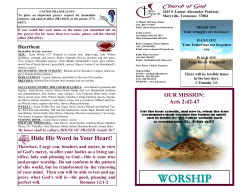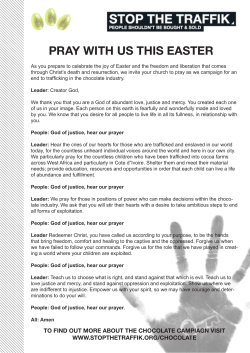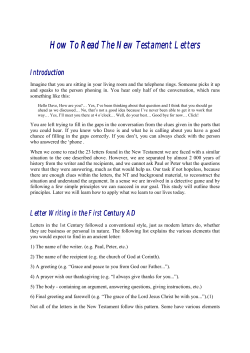
Editor’s Note Change Bible Church Volume 2, Issue 2 March 2013
Change Bible Church Change news Volume 2, Issue 2 March 2013 Inside this issue: Editor’s Note Welcome to the Easter edition of Change News. In a few hours, the Change Bible Church Easter Convention 2013 will begin. We thank the Lord once more for the privilege to celebrate His work on the cross with our church family as we anticipate another awesome Easter convention. In case you have not heard, Dr Eva Seobi, Bishop Tudor Bismark, Bishop Stanley Simunyola and Dr Elijah Maswanganyi will be sharing the Word this weekend. Bishop Tudor Bismark’s message from last year, entitled ‘Be fruitful and multiply’ still resonates in many people's hearts and minds, and I am sure this year will be even better. Thank you to our Senior Pastor for his obedience, his tenacity and can-do attitude. Viva! In this issue, we have attempted to strike a balance between words and pictures. This does not mean that we have shifted from our original mandate of ‘promoting a culture of reading within the church’, but we are trying to appease divergent preferences. Some people prefer reading; while others prefer looking at pictures. I prefer both! keeping with the theme for this month, we thought we would go back to the basics of Christianity and what it means, hoping that it will strike a chord with both the bornagain and not yet born-again, if you will. Please do enjoy the cartoons on page 3– it’s good, clean humour:-) God did create humour after all, innit? On page1, you will see some portraits from the Men’s braai that took place on the 16th of March. You will also see some pictures of the Bible School 2013 class. In case you don't know, the classes will resume on Tuesday, the 2nd of April, next week. Join me there. You can get the application forms from the Church Office during the week, or at the Info desk on Sundays. This is an opportunity of a lifetime if you desire to be a student of God’s Word and a knowledgeable and wise Mzalwane overall. From the Changemedia Team, we wish you a blessed Easter weekend. Lindz Page 2 sees the continuation of the article from last month, ‘Discovering your Destiny’, this time focusing on developing a vision for your life. In This Month in Pictures 1 Discovering your Destiny– Part two 2 What is Christianity 3 Church Information 4 Biblical HermeneuticsPart two 4 ‘All authority in heaven and on earth has been given to me. Therefore go and make disciples of all nations, baptizing them in the name of the Father and the Son and of the Holy Spirit, and teaching them to obey everything I have commanded you. And surely I am with you always, to the end of the age.” Matt28:1820 This month in Pictures Easter Convention 2013! MARCH See u there! 29 March - Good Friday 31 March - Easter Sunday 01 April - Family Day Easter is a Christian festival and holiday celebrating the resurrection of Jesus Christ on the third day after His crucifixion. Men’s Braai. Now for the ladies… Easter is a movable feast, meaning it is not fixed in relation to the calendar. The custom of the Easter eggs originated amongst the early church of Mesopotamia, who stained eggs red in memory of the blood of Christ shed at crucifixion. The Christian church officially adopted the custom, regarding the eggs as a symbol of the resurrection. Bible School Open Day. Official start date– Tuesday, 2nd April 2013 1 Change News Page 2 Discovering your Destiny - Part two A Vision for your life Destiny and calling - what Vision– how Calling and destiny indicate the potential of God’s greatness and purpose for our lives. Vision is what makes it real and most tangible– something we can see in our hearts. Hebrews 11:13 describes how God’s heroes of faith ‘saw the things promised, and welcomed them from a distance.’ This is the essence of what vision is - seeing detail in the promise of God for our lives (the call of God), and welcoming it with joy as Gods destiny even though it may be far from fulfilment. The importance of vision Proverbs 28:19 shows that ‘without vision, the people perish (or live without restraint).’ Human beings are created to live for a cause and a purpose. Without such purpose, we are tempted to live unrestrained, idle and despondent lives. Vision produces that ‘something definite’ for us to live for Vision is also important for us as it gives us something to be accountable to Habakkuk 2:3– Vision gives us certainty and firm foundations for our energy. Similarly, vision gives us clarity in making decisions (‘so that a herald may run with it’). We can evaluate opportunities in terms of our vision. How we develop vision If we examine the vision that those mentioned in Hebrews 11 had, it is clear that if flowed from Gods’ promises and that He was the initiator of vision in the lives of the heroes of faith. Without a doubt, God, as the author and perfecter of our faith, is the initiator of vision for our lives. However, many Christians make a mistake in thinking that a fully developed vision will come from God to each of us, and that from then we will have a clear direction and passion for the future. -Firstly, God looks for a seeking heart. Passivity which is sometimes justified as ‘waiting on God’ is inconsistent with a hungry and seeking heart. -Secondly, God does not make all the decisions in our lives. He gives us a will and mind to think so that, with sanctified motives and godly wisdom from His Word, we are able to make decisions that glorify Him. Developing a vision for your life The six ‘P’s of vision provide guidance for developing a vision for your life. There is a lot more to developing a vision than simply receiving a prophetic word from an external source, or expecting God to paint the full picture for you in a dream of vision. It takes thought, consultation, prayer and exploration to develop God’s vision for your life. Each of the six ‘P’s provide a piece of the overall puzzle. No one piece should be overemphasised or considered in isolation from the others. We must realise that vision develops progressively in our lives. As we progress in our vision, we will begin to identify God’s purposes more clearly. Vision is Predestined: look behind God has prepared our life’s plan before we were born, and has providentially shaped the events of our past, even before we became Christians. Because of this we must consider our past, the preparation we have received, the people we have been exposed to and the things we have learnt. These are all clues for the future Vision is Personal: look within Look within you to the desires that are in your heart. God has created each one of us, an placed desires in our hearts - but check your motives. Vision is People-focussed: look around God usually inter-weaves our destiny and purpose (and hence the vision we should follow) with the people that He has placed around us, particularly the local church in which He has planted us. We should therefore consider what He is doing in the lives of the people close to us, and what the vision of our church is. Vision is Posterity-focused: look at the generations to follow God’s purpose for our lives continues as He desires us to pass on the baton to our children, and they in turn to their children. You may not completely fulfil the end purpose of your destiny in God. Personal assignment: -Write down what you understand right now as being the key features of God’s call on your life. -Using these key features, begin to dream and develop a 10 year picture of your life. Imagine your life 10 years from now. What have you achieved in each area of your life (family, church, career, etc.) SALE!!! SALE!!! SALE!!! THE CHANGE BOOKSHOP IS RUNNING A HALF-PRICE SALE THIS EASTER WEEKEND. BOOKS, MUSIC DVD’S AND CD’S, SERMON DVD’S ARE ALL ON SALE AT 50% OFF MARKED PRICE Vision is Prophetic: look above -Firstly, vision flows from God’s Word to us. We must seek out God’s will and His Word to us, -Secondly, vision requires faith in God to be fulfilled. As is often said, “If your vision doesn't scare you it is not from God.” A vision from God must stretch our faith. sider the resources we have and our capabilities. Vision is Practical: look in your hand We must think of what can be done with the things we have. If you have money, think of what you can do with it for God. If you have skills, how can you use them. We must con- 2 ALSO ON SALE IS THE ‘LOVE ABOVE ALL’ EASTER PRODUCTION DVD. FOR ONLY R45!!! Volume II, Issue II Page 3 What is Christianity? Many people, including some Christians think that being a Christian means being religious, that God should be worshiped in a particular way, in order for our faith to be legitimate. This is a false and deceiving statement. Rather, through Jesus Christ, we are introduced to a magnificent, holy but totally loving God. Christianity is a relationship with this God, a way of life that does not separate our ‘Christian’ and ‘secular’ beliefs, but instead defines who we are, and who we will become. It is applying Godly and biblical principles in our life. That is, loving God first, and loving people around us, even our enemies, just as we love ourselves. It is following the example of Jesus. Christianity’s foundations are found in Jesus’ life, death and resurrection. We must acknowledge the greatest mystery of all time: God’s plan to redeem humankind and restore all people. In Christ, the mystery has been revealed, to the benefit of all people! The Bible says, “But now in Christ Jesus you who were far off have been brought near through the blood of Christ.” (Ephesians 2:13). Thus we note that through the death of Christ by crucifixion we are brought closer to God. The broken rela- tionship between God and man is mended. Christianity goes beyond the concept of religion. In truth it brings about a new kind of life; ‘If anyone is in Christ, he is a new creation; old thing have passed away; behold all things have become new.” (2 Corinthians 5:17). This is what it means to be ‘born again’; a spiritual transformation. Christianity is a lifestyle meant to be lived today! Prayer, the conversation between man and God, shifts from being a mindless ritual to a meaningful interaction. The Word of God ceases to be a book of religious rules, and becomes a guide for life. This undoubtedly distinguishes Christianity from any other religion. It is not about rules, but about love. at the door and knock. If anyone hears My voice and opens the door, I will go in and eat with him, and he with me.” You have a choice to make, the choice of rejecting Him or accepting Him as your Lord. As disciples or followers of Christ we are called to follow in the footsteps of Jesus. As Christians we are representatives of Christ on earth. We are called to renew our minds from our old way of thinking to a way that is in line with God’s Word (Romans 12:2) We do this by reading the Bible, meditating (continuously thinking) on the scriptures we read and applying them in our lives. In Joshua 1:8 it is written: ‘Do not let this Book of the law depart form your mouth; meditate on it day and night, so that you may be careful to do everything written in it.” How do we become Christians then? God is totally holy, meaning that as imperfect people we cannot hope to relate to Him. However, what cannot be accomplished by people or good deeds, God was able to do through Jesus Christ. When Jesus died, it was substitute for us and our impurities. When He rose on the third day it was a sign of triumph. Being a Christian means accepting God’s offer of reconciliation, trusting Him, and asking Him to change the course of your personal life. Revelations 3:20 says, “Here I am! I stand For God so loved the world That He Gave His one and only Son, That whoever believes in Him, Shall not perish, but have eternal life. John 3:16 3 Change Bible Church Sunday Sunday Services 7am- 08:45am, 9am-11am, 11:15am-1pm Intercessory Prayer 6.30am Membership Class 8am, 9am and 10am New Birth Class 9am Physical Address: 485 Makau Street Tsolo Section Katlehong, 1431 Monday Prayer 5am-6am Prayer 6pm-7pm New Birth Class 6pm Phone: (011) 860 5203/5273 Fax: 086 698 8986 E-mail: info@changebiblechurch.co.za Tuesday Service 10am Prayer 5pm-6pm New Birth Class 6pm Visit our website: www.changebiblechurch.co.za Wednesday Prayer 5am-6am Trans4meZ Prayer 4.30pm-5.30pm Membership Class 6pm Follow us on: Church Banking Details Building Fund Banking Details Name: Life Changing Word Bible Church Type: Money Market/Savings Bank: FNB Account no: 62065048334 Branch Code: 254605 Branch: Sandton City Name: Life Changing Word Bible Church Type: Cheque Account Bank: FNB Account no: 62065052781 Branch Code: 254605 Branch: Sandton City Thursday Service 6pm-8pm Prayer 5am-6am Intercessory Prayer 5.45pm Senior Citizens Service 11am-1pm Friday Trans4meZ Bible Study 4pm-5pm Rooted Prayer 6pm-7pm You can contact the Editorial Team @: changemedia@changebiblechurch.co.za Saturday School of Prayer 3pm-5pm Biblical Hermeneutics– Part two “Open my eyes, Lord, that I might behold wondrous things out of your law.” (Psalm 119:18) Which translation of the Bible should I use? There are three types of Bible translations: 1. Paraphrase (rephrasing of existing translations) These are translations that seek to bridge all the gaps between what is in the original manuscript and the reader. Examples include: The Living Bible; The Message. The problem with these translations is that the reader ends up reading the ideas put forward by the paraphraser and not the original writer. 2. The Dynamic Equivalent Modern Translation (thought-for-thought) These translations sit loosely with the modern equivalent of the original writings. They try to translate in a meaningful way by using the modern equivalents of biblical words/phrases. Examples include: NIV, NLT, The Good News Bible 3. A Literal Translation (word-for-word) This translation seeks to be faithful to the form of the original language. Examples include: KJV, New American Standard Bible, the Revised Standard Version. Modern versions of literal translations –which seek to remain faithful to the original text but in modern language are the NKJV, ESV and AMP. Different translations are useful at different times, but if you desire to carefully study God’s Word, a literal translation is best! Terminology 1. Exegesis– Exegesis is derived from two Greek words which when translated mean ‘to lead out’. Thus exegesis is used for leading or reading out what text says- describes the process of ascertaining what a text of scripture says, having regard to linguistic, grammatical, literary, historical, geographical, cultural and theological considerations. 2. Hermeneutics– Hermeneutics is the process of interpreting for us today, the meaning and relevance of what has been discovered through exegesis. When studying the Bible, you need to consider the context within which it was written. -The linguistic context. The original languages of 4 the Bible are Ancient Hebrew, Ancient Aramaic and the News Testament Greek. To get the meaning of a word look at its origins, compare it in all its occurrences in the Bible, what is its cultural meaning, look at its equivalent in another language to get some idea of what the meaning might be. -The cultural context. What was the prevailing culture of the biblical writers. This might, and probably is different from our own. -The geographical context. Become acquainted with the cities, states empires mentioned in the Bible; the climate, land, seas, mountains mentioned; the plants, birds, animals of the Bible. -The historical context. You need to be familiar with the historical settings of the events of the Bible; the political context, the economic and social context or environment, the religious context or environment. In the next issue we will look at observation, or the art of surveying and analysing a book of the Bible. Question: Which Book of the Bible is your favourite and why?
© Copyright 2025
